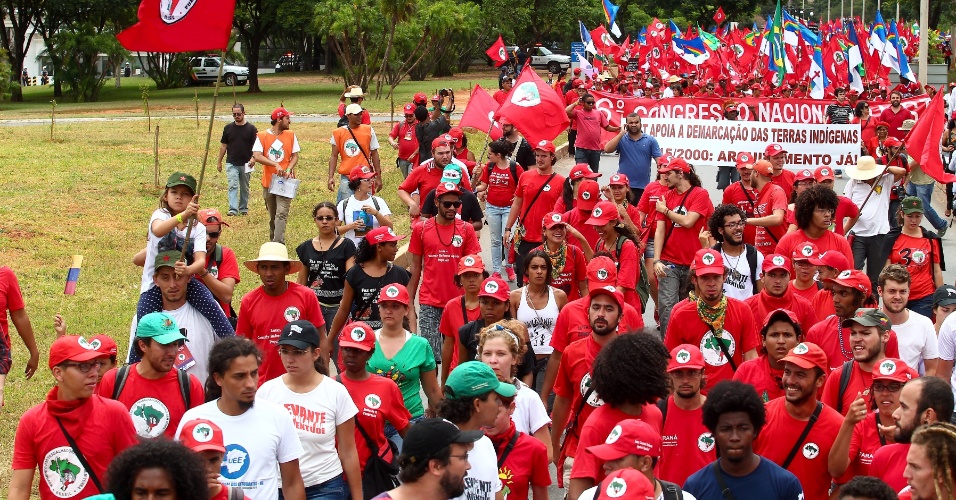On the neoliberal right, President da Silva of Brazil and his Agricultural Minister have provided massive resources to the agro-business export sector, relegating ecological, human rights, small farmer and landless worker demands to the lowest of priorities.
Despite this seeming consensus among academics and politicians, the peasantry refuses to disappear.
ADVERTISEMENTS:
Over the past twenty years, the peasantry has re- emerged, playing a central role in changing regimes, determining national agendas, leading struggles against international trade agreements (ALCA or Free Trade Area of the Americas), as well as establishing regional and local bases of power.
In many countries, coalitions of landless farm workers, small family farmers and peasants have been central to national struggles against neo-liberal regimes and free trade policies. Rural movements have detonated larger struggles, activating urban classes, trade unions, civic groups, and human right organisations.
Most of the movements have built local bases of political hegemony as a springboard to national power and challenges for state power, the cases of CONAIE (National Confederation of Indigenous Nationalities) in Ecuador and the Cocaleros (coca farmers) in Bolivia are illustrative.
While re-vindication of ethnic or Indian/African- American rights and autonomy are central to many peasant movements, they are strongly linked to class interests and horizontal alliance with other exploited classes.
ADVERTISEMENTS:
Both the micro and macro conceptions of peasant struggles are mechanical, one-sided, and fragmented perceptions of dialectical activity in which peasant movements combines local and national struggles, social and political demands, class and ethnic consciousness. One cannot extrapolate these patterns of peasant activity from specific times and places.
For example, in a time of severe political repression or political disillusionment, peasant movements may shift their agendas to local demands, specific projects and defensive activities. In contrast, in a period of expanding membership and victorious struggles, peasant movements tend to raise national issues and challenge the authority of the central political powers.
Most peasant movements are directly engaged in one another form of political action. With one notable exception, all of the, major peasant leaders think and act to accumulate political power and, hopefully, to transform, share, or take state power.
Peasant movements vary in their attitudes toward direct action and electoral strategies. In some cases, the movements modify their strategies, depending on external circumstances and internal changes.
ADVERTISEMENTS:
Generally, peasant movements rely mostly on direct action strategies- occupying large estates, blocking highways, taking over municipal offices, etc. Electoral activities take various forms; creating new political Organisations or supporting an excising urban “leftist” or “populist” party.
Recent history demonstrates that peasant movements exercise significant power in civil society. They organise, mobilise, and intervene to promote positive changes in land tenure, block regressive free trade policies, and even topple corrupt regimes.
In most national contests, the states, both federal and provincial, have been enemies of peasant movements. In Mexico, the state has severely repressed peasant movements in Chiapas, Guerrero, Oaxaca and throughout southern- central Mexico.
In Colombia, thousands of peasant leaders have been assassinated by paramilitary groups associated with the Armed Forces which have displaced over three million peasants in pursuit of a scorched earth policy.
In Brazil before and during the Lula presidency scores of peasant activists, religious and human rights advocates have been murdered by local gunmen with the complicity of provincial judges, police chiefs and the malignant neglect of the federal government.
In many countries of Latin American, peasant movements play a major political role in influencing national politics into the twenty- first century. In Bolivia, Brazil, Colombia, Ecuador, Peru, Central America, Paraguay, and Mexico, peasant-farmer and peasant-Indian
Organisations have been instrumental at different moments in setting national agendas. While it is clear that in all countries the percentage of rural residents has declined, the quality of social organisations and leadership has improved in many cases at least compared to urban popular organisations.
Peasant movements have played a decisive role in forcing the resignations of a series of corrupt rulers who were responsible for impoverishing the country, giving away natural resources and strategic sectors of the economy to foreign multinationals and indebting the country. They have also led the fight against genetically modified and chemically based agriculture promoted by Monsanto, in favour of ecologically sound cultivation.
Peasant movements have led the struggle against fumigation of food crops and in defence of coca farming, an important source of family income, with a multiplier effect throughout the economy.
Peasant leaders demand that Washington fight drugs by prosecuting its elite allies who process and traffic and the US banks that “wash” illegal drug profits.
Peasant movements have been part of national coalitions against privatisation legislation, US military bases and payment of the illegal foreign debt. Direct actions by peasant movements have delayed or blocked austerity programmes promoted by the IMP.
Clearly, without peasant land occupations there would be no agrarian reform process in Venezuela today, as the wheels of bureaucratic change are slow and indecisive.
Given the fact that no progressive agrarian legislation or executive decrees have been approved by any regime throughout Latin American for at least the last 20 years (except Venezuela under Chavez), direct action by peasant movements takes on a greater significance as the only vehicle for defending their claims to land, credit, markets, and protection against dumping.

